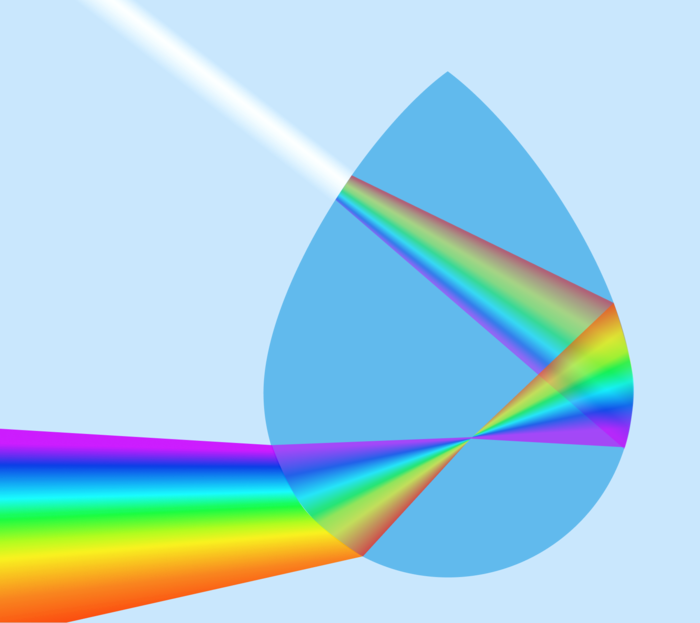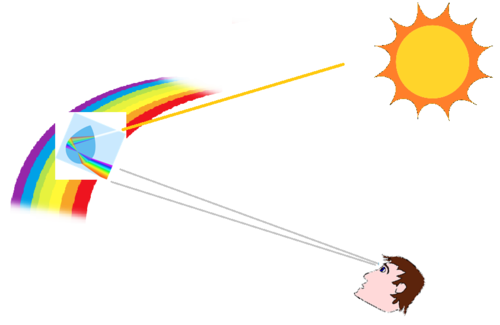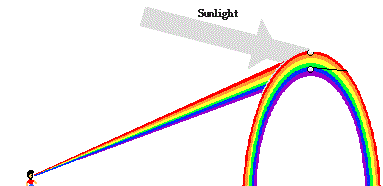Where is the Rainbow?
 An artist's rendering of refraction and reflection in a water droplet.
An artist's rendering of refraction and reflection in a water droplet.
When it rains on a sunny day, sometimes we see rainbows—circular arcs of every color from red to violet. When sunlight hits a water droplet, the light bends and is reflected at a specific angle. Different colors of light bend differently, so the droplets split up sunlight into a band of colors.
If the conditions are right, which direction should you face to most likely see a rainbow?
This section requires Javascript.
You are seeing this because something didn't load right. We suggest you, (a) try
refreshing the page, (b) enabling javascript if it is disabled on your browser and,
finally, (c)
loading the
non-javascript version of this page
. We're sorry about the hassle.
9 solutions
 We note that the rainbow is formed on the other side of the raindrops, we are most likely to see a rainbow if we face
away from the Sun
.
We note that the rainbow is formed on the other side of the raindrops, we are most likely to see a rainbow if we face
away from the Sun
.
Nice solution sir! By the way, don't know you also master at Physics related problem!
Log in to reply
I achieve level 5 for Classical Mechanics in Brilliant.org. See my profile .
This picture is misleading. You aren't seeing a projection on the sky behind the water droplets, but rather each individual droplet sends a tiny bit of rainbow directly to your eye (if it's at the correct angle)
Log in to reply
It is just that I am lack of a proper drawing software. Anyway, I have changed the image.
Log in to reply
It still looks like the water droplet is projecting the sun's rays onto the sky. Ram Mohith's illustration is much more accurate.
Log in to reply
@Jeremy Galvagni – Sorry, I think I got it now.
Log in to reply
@Chew-Seong Cheong – You did. Looks great now. Upvoted.
The picture is plain wrong. The viewer would have to turn 180 degrees to see the refracted light as pictured. In fact, the problem is not stated correctly as water droplets are 3-dimensional, thus refracting and reflecting light in many directions, making a rainbow visible from a range of viewpoints, not just "away" from the sun.
Log in to reply
Thanks, why don't you provide your solution.
Sorry, I think I got it now.
Here are two Korean adages:
"Don't cross the river when there's a morning rainbow."
"Don't tie your cow by the riverside when you see a rainbow in the west sky."
Try and infer that this makes sense from this problem and the climatic and latitudinal condition of the Korean peninsula. :)
But water droplets have been studied and proven to be more spherical than..... pointy???..... You get my point. That artistic representation is incorrect!
Log in to reply
The original illustration was spherical. This one is an "artist's" and not "physicist's" impression.
Most importantly, since your eyes move independently from your head, the direction you face is less important Thant the direction from which your eyes look
When you can see a double rainbow , the second (upper) one is light that has been reflected twice in the individual raindrops , and the colours are reversed. It's also possible , though very rare , to have a triple!
 When right rays hit the water droplets they they undergo total internal reflection. That means they get reflected to the ground. So, it its better to stand in the opposite direction to the sun to most likely see a rainbow.
When right rays hit the water droplets they they undergo total internal reflection. That means they get reflected to the ground. So, it its better to stand in the opposite direction to the sun to most likely see a rainbow.
Why is there total reflection?
Log in to reply
Because the angle of incidence is greater than 49 which is critical angle for water.
A rainbow is the upper half of a circle whose center is collinear with the sun (behind the observer) and the observer’s eyeball.
Not just the upper half. If there are clouds below the level of the horizon (e.g. if the observer is in an airplane) a rainbow can be anything up to the full circle.
You shouldn't look at the sun. Easy.
Yeah! They can do serious damage to your eyes
The best way to answer this is the most fun. Go outside on a sunny day and play with a hose or sprinkler. The rainbow will form a circular halo centred on the shadow of your head (or really, eyes).
The boring reason for this is that the angle of reflection in the drop is acute.
becase the screen(ie. clouds) should be in opposite direction from the sun for a real image
I used to see Rainbow after rain!😁
I just thought that if a rainbow is a reflection then to see it best you would want to face the same direction as what's being reflected (the sun) as much as possible
The water would be reflecting the rainbow. If we look at the diagram in the quiz closely, we see that it is reflecting the light.